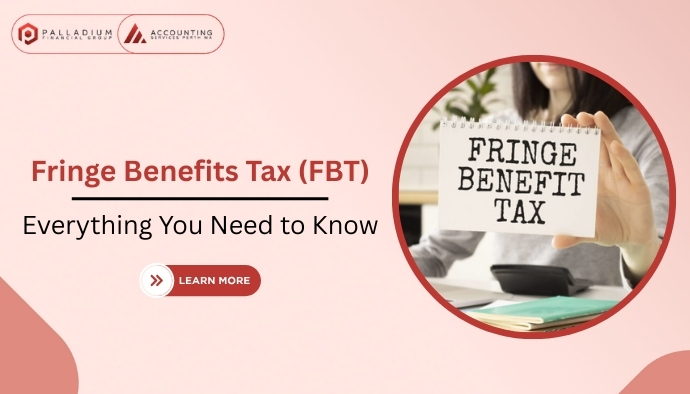Level 1, 206 Adelaide Terrace, Perth WA 6004
230 Railway Parade, Cannington WA 6107

Operating a business in Australia is associated with numerous tax requirements, and one of the most confusing to employers is the Fringe Benefits Tax (FBT). Although the perks provided to the employees can serve as a method of attracting and retaining the best employees, it is important to know how these benefits are taxed, as well as the compliance that businesses need to observe.
To the employers, a business accountant and a business owner, FBT is an essential aspect of business accounting in Australia because failure to comply attracts consequences. This guide describes the nature of FBT, who is required to pay it, the rates, exemptions, and how business can effectively manage their obligation.
Fringe Benefits Tax refers to the tax that employers pay on some non-cash benefits offered to employees or their associates, including family members. FBT is paid by the employer, unlike the income tax, which the employee pays. It is used when the benefits provided by the businesses are not in the form of a salary or wage, like a car operating allowance that the business is providing.
FBT belongs to the Australian taxation mechanism aimed at fairness and responsibility. Because employee benefits are regarded as remuneration, by taxing them via FBT, employers are not enabled to design salaries as a purely perks package to lower taxable income. Regardless of the size of their business, FBT knowledge is the key to tax compliance in Australia.
All employers who provide non-cash benefits to employees are potentially liable for FBT. Businesses, sole traders, partnerships, and not-for-profits fall into this category. Even as a small operator, providing benefits such as cars, meal entertainment, or reimbursement of private expenses can activate FBT obligations.
For companies utilising small business accounting services or seeking the expertise of a business services accountant, FBT is an ongoing issue throughout the financial year. Employers should also keep in mind that contractors are typically not employees, and as such, benefits to them typically don’t qualify under FBT rules.
The Australian Taxation Office (ATO) provides several fringe benefit types, which include:
For companies, knowing these categories is of immense importance to a business accounting service and being in compliance. Professional advice from a business management consultant or business advisory service Perth will assist in navigating through these complexities.
FBT rates Australia are determined by the government and are tied to the highest marginal tax rate of income. For the FBT year ending 31 March 2025, the rate is 47%. The rate is applied to the grossed-up taxable value of the benefits given.
There are two gross-up methods:
They can be intricate, and that’s why most employers would seek help from small business accountants Perth to get it right on FBT returns.
Not all benefits need to be reported for FBT. Certain FBT exemptions assist companies in lessening the liability, including:
There are concessions also available for charities, not-for-profits, and some small businesses. Knowing FBT exemptions is important in lowering costs and having small business advice Perth to comply with.
The employers are required to file an FBT return at the end of the year, and the FBT year commences on 1 April to 31 March. The payment should be made in May every year. FBT-registered businesses may be required to pay quarterly instalments using their BAS (Business Activity Statement).
Reporting is an essential part, and here is where a small business tax accountant comes into play. Most companies also develop a financial advisor business plan incorporating FBT requirements into more general business accounting Australia plans so that there is no deadline missed.
FBT and income tax are two distinct systems. Income tax is charged directly on the wages of employees, whereas FBT charges the value of non-cash benefits to the employers.
Under the rules of accounting service in business, employers are often able to claim the FBT payments as a deduction, although there are variations in the reporting processes. Compliance problems might arise when businesses fail to distinguish the two; that is why professional assistance from the business advisory Perth team is strongly advised.
Well-intentioned businesses also commit mistakes with FBT. Common mistakes include:
These errors attract penalties and interest charges. To avoid these, businesses will usually seek the services of a business advisory service in Perth or seek the services of a business management advisor to ensure correct reporting.
There are various tips to minimise the FBT liabilities of employers while staying compliant:
By hiring small business advice Perth and consulting with business accountants Perth, employers can maximise tax results while remaining competitive in terms of providing employee benefits Australia.
Also read: 9 Tax Tips for Small Business Owners
Fringe Benefits Tax is a key aspect of Australian business accounting that affects employers of both small and large sizes. Knowing the rates of FBT in Australia, the FBT exemptions available, and compliance requirements is critical for smooth operations. Whether it’s administering payroll tax, providing employee benefits in Australia, or looking at more holistic approaches with a business advisory Perth firm, having the right information is what makes the difference.
Hiring a skilled business financial advisor or skilled business services accountant means your business stays compliant, saves on penalties, and benefits from professional tax planning.
For companies seeking to streamline FBT obligations and improve overall money management, seeking assistance from small business tax accountants offers the clarity and confidence required for success.